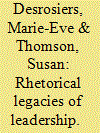| Srl | Item |
| 1 |
ID:
152665


|
|
|
|
|
| Summary/Abstract |
“Rather than addressing the trauma inflicted by genocidal violence, the ruling party has used a program of national ethnic unity and reconciliation to reinforce its political authority.”
|
|
|
|
|
|
|
|
|
|
|
|
|
|
|
|
| 2 |
ID:
106966


|
|
|
|
|
| Publication |
2011.
|
| Summary/Abstract |
Comparing pre- and post-genocide Rwanda, this article argues that clear continuities exist between the regimes of Juvénal Habyarimana and Paul Kagame. Both have projected a remarkably similar image of 'benevolent leadership'. Presenting themselves as harbingers of an 'improved' or 'new' Rwanda, both leaderships have claimed to be best able and willing to guide Rwanda along the right path to peace, security, ethnic unity and development. 'Benevolent leadership' in both periods has also served as a tool to try and shape regime relationships with international and domestic audiences. Internationally, each government has worked to promote Rwanda and its authorities as a good development partner. Domestically, these projections have served to establish norms of order and obedience. We argue that projections of 'benevolent leadership' have been a tool designed to win over the international community and discipline the Rwandan population.
|
|
|
|
|
|
|
|
|
|
|
|
|
|
|
|
| 3 |
ID:
106033


|
|
|
|
|
| Publication |
2011.
|
| Summary/Abstract |
The government in post-genocide Rwanda stakes its moral claim to legitimacy on a policy of national unity and reconciliation, claiming to create a 'Rwanda for all Rwandans'. This article investigates peasant resistance to this policy. Focusing on everyday acts of resistance among the rural poor, it demonstrates that despite the appearance of widespread popular support, many peasant Rwandans consider the various mechanisms of national unity and reconciliation to be unjust and illegitimate. Obedience to the dictates of the policy of national unity is frequently tactical, rather than sincere, as peasants employ various strategies to avoid participation. Through a focus on everyday acts of resistance, the article reveals how the post-genocide state through the policy of national unity and reconciliation seeks to depoliticize peasant people by orchestrating public performances and by closing off the possibility for individuals to join together to organize politically.
|
|
|
|
|
|
|
|
|
|
|
|
|
|
|
|